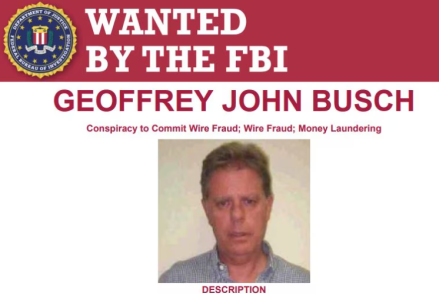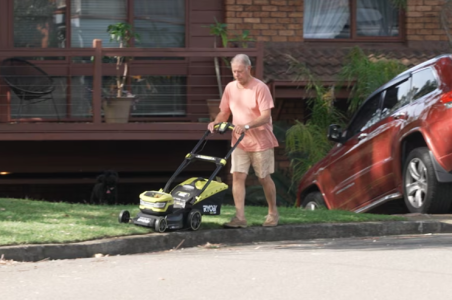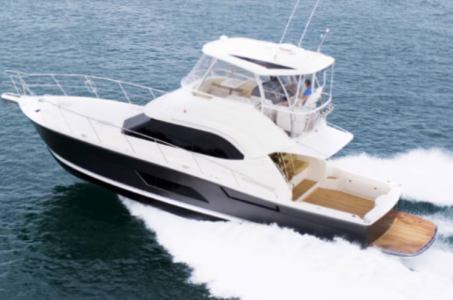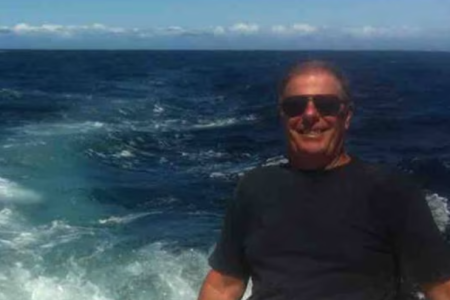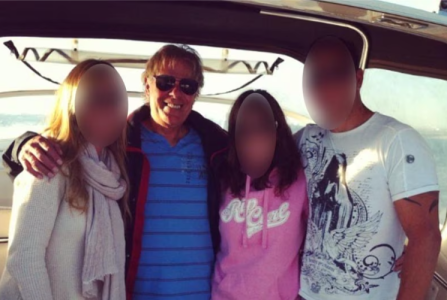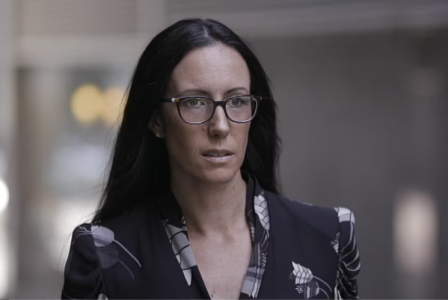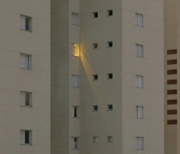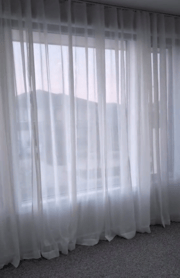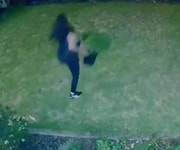Australian man Geoffrey John Busch is on the FBI's most wanted list. We found him in Sydney
By
ABC News
- Replies 0
A fugitive on the FBI's most wanted list has been quietly living in Sydney for almost two decades.
Geoffrey John Busch is wanted over an alleged investment scam in Florida in the early 2000s.
The 78-year-old is accused of taking part in a $US12.3 million ($19 million) get-rich-quick scheme between 2002 and 2006, according to US court documents.
Investors were allegedly told their funds would be placed in a non-existent "high-yield trading program", but the cash was siphoned into personal bank accounts.
Mr Busch was indicted by a grand jury in Florida in 2007, charged with conspiracy to commit wire fraud, wire fraud and money laundering.
The maximum sentence for wire fraud alone is 20 years in prison.
In December, the FBI issued a new alert asking for public tip-offs about his whereabouts.
The ABC tracked Mr Busch down to a red brick home on a quiet cul-de-sac in the Sutherland Shire in southern Sydney.
He denied he had been evading international authorities for almost 20 years.
"I'm not avoiding arrest, I've done nothing wrong—it's a travesty," Mr Busch said.
"I didn't rip off any investors at all. I was implicated in something I didn't have any involvement in."
The Caringbah grandfather has not attempted to conceal his identity or location.
On social media, under his full name, he even lists his current city as "Sydney".
He said he was aware of the wanted poster but was not in hiding.
"I've been living. I've been living in a family environment," he said.
According to the indictment in the US District Court, he allegedly received more than $US1.3 million between 2004 and 2005 from the investment scheme.
Mr Busch is accused of using the proceeds to buy a $US500,000 Riviera 43 yacht, pay his son's $US21,300 criminal defence legal bills and pay off a $US40,000 personal debt.
Property records suggest his Caringbah home was purchased in 2004, mortgage free.
Mr Busch's solicitor Sam Macedone said his client received "above board" commissions for referring investors, but Mr Busch was unaware it was a scam.
Most wanted
The FBI issued a federal warrant for Mr Busch's arrest in 2007 and alerted the Australian government.
In the same year, US man Ray Allen Benton pleaded guilty to conspiracy to commit wire fraud in relation to the Florida scam.
Court documents list Mr Benton and Mr Busch as "co-conspirators".
Mr Benton was sentenced to five years' prison, which was later reduced to three.
The American man was ordered to pay back investors and forfeit his private plane and Mercedes-Benz.
At the time, US prosecutors also attempted to seize Mr Busch's yacht but were unsuccessful.
In 2015 a US court updated Mr Busch's status to "fugitive".
The Australian man first appeared on the FBI's most-wanted list in 2018, after his indictment was unsealed.
He is one of 35 alleged white-collar criminals featured on the website, alongside others such as Russian man Roman Semenov, who is accused of creating a cryptocurrency mixer used by North Korean hackers to launder money.
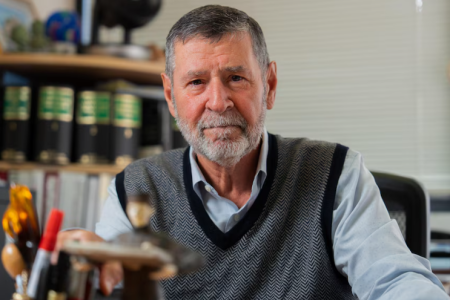
Mr Macedone said he did not know why his client was still being hunted, as he had previously been interviewed by the Australian Federal Police (AFP) "on behalf of the FBI" in November 2006 and January 2007 and did not hear anything further.
Since returning to Australia, Mr Busch has allegedly racked up a substantial tax debt.
Court records show the Australian Tax Office (ATO) attempted to bankrupt Mr Busch in 2017 over $3.5 million in alleged unpaid taxes.
However, a sequestration order to seize his assets does not appear to have been made.
Mr Busch remains an undischarged bankrupt, according to the national personal insolvency index, which means he is disqualified from being a company director in Australia.
The failed businessman, who once owned a Delta Home Video company, was previously bankrupted in 1994.
Mr Macedone said his client denies "ever receiving a bankruptcy notice from the ATO" and was "charged with non-lodgement of tax returns some time ago but was not fined or penalised".
The ATO declined to comment.
'Doesn't add up'
The Attorney-General's Department was unable to confirm if the US had ever sought Mr Busch's extradition.
Court records suggest the attorney-general has not asked a judge or magistrate to determine if Mr Busch is eligible for surrender, which is the typical process once a request is made.
Prominent criminal defence lawyer Zarah Garde-Wilson, who has worked on high-profile extradition cases, said it was likely the US had not made an extradition request.
"Typically, people only get extradited in relation to murder, if it's terrorism-related or if they don't have citizenship status in Australia."
Ms Zarah Garde-Wilson said it was clear the US knew where he was, and the charges appeared to meet the threshold for extradition under the treaty.
A former senior political figure, who was unable to comment publicly, said if an extradition request had been made, it would be "highly unusual" for Australia not to pursue it, given the request is from a "friendly" country like the US.
"This is bizarre... it doesn't add up."
He also said the FBI could make a direct request for assistance at any time, which would be "inconceivable" for Australia to ignore.
The FBI, AFP, US and Australian governments declined to comment on the case.
Written by Amy Greenbank, ABC News.
Geoffrey John Busch is wanted over an alleged investment scam in Florida in the early 2000s.
The 78-year-old is accused of taking part in a $US12.3 million ($19 million) get-rich-quick scheme between 2002 and 2006, according to US court documents.
Investors were allegedly told their funds would be placed in a non-existent "high-yield trading program", but the cash was siphoned into personal bank accounts.
Mr Busch was indicted by a grand jury in Florida in 2007, charged with conspiracy to commit wire fraud, wire fraud and money laundering.
The maximum sentence for wire fraud alone is 20 years in prison.
In December, the FBI issued a new alert asking for public tip-offs about his whereabouts.
The ABC tracked Mr Busch down to a red brick home on a quiet cul-de-sac in the Sutherland Shire in southern Sydney.
He denied he had been evading international authorities for almost 20 years.
"I'm not avoiding arrest, I've done nothing wrong—it's a travesty," Mr Busch said.
"I didn't rip off any investors at all. I was implicated in something I didn't have any involvement in."
The Caringbah grandfather has not attempted to conceal his identity or location.
On social media, under his full name, he even lists his current city as "Sydney".
He said he was aware of the wanted poster but was not in hiding.
"I've been living. I've been living in a family environment," he said.
According to the indictment in the US District Court, he allegedly received more than $US1.3 million between 2004 and 2005 from the investment scheme.
Mr Busch is accused of using the proceeds to buy a $US500,000 Riviera 43 yacht, pay his son's $US21,300 criminal defence legal bills and pay off a $US40,000 personal debt.
Property records suggest his Caringbah home was purchased in 2004, mortgage free.
Mr Busch's solicitor Sam Macedone said his client received "above board" commissions for referring investors, but Mr Busch was unaware it was a scam.
Most wanted
The FBI issued a federal warrant for Mr Busch's arrest in 2007 and alerted the Australian government.
In the same year, US man Ray Allen Benton pleaded guilty to conspiracy to commit wire fraud in relation to the Florida scam.
Court documents list Mr Benton and Mr Busch as "co-conspirators".
Mr Benton was sentenced to five years' prison, which was later reduced to three.
The American man was ordered to pay back investors and forfeit his private plane and Mercedes-Benz.
At the time, US prosecutors also attempted to seize Mr Busch's yacht but were unsuccessful.
In 2015 a US court updated Mr Busch's status to "fugitive".
The Australian man first appeared on the FBI's most-wanted list in 2018, after his indictment was unsealed.
He is one of 35 alleged white-collar criminals featured on the website, alongside others such as Russian man Roman Semenov, who is accused of creating a cryptocurrency mixer used by North Korean hackers to launder money.

Solicitor Sam Macedone said the money his client recieved was "above board". (ABC News: Jack Ailwood)
Multi-million-dollar tax debtSince returning to Australia, Mr Busch has allegedly racked up a substantial tax debt.
Court records show the Australian Tax Office (ATO) attempted to bankrupt Mr Busch in 2017 over $3.5 million in alleged unpaid taxes.
However, a sequestration order to seize his assets does not appear to have been made.
Mr Busch remains an undischarged bankrupt, according to the national personal insolvency index, which means he is disqualified from being a company director in Australia.
The failed businessman, who once owned a Delta Home Video company, was previously bankrupted in 1994.
Mr Macedone said his client denies "ever receiving a bankruptcy notice from the ATO" and was "charged with non-lodgement of tax returns some time ago but was not fined or penalised".
The ATO declined to comment.
The Attorney-General's Department was unable to confirm if the US had ever sought Mr Busch's extradition.
Court records suggest the attorney-general has not asked a judge or magistrate to determine if Mr Busch is eligible for surrender, which is the typical process once a request is made.
Prominent criminal defence lawyer Zarah Garde-Wilson, who has worked on high-profile extradition cases, said it was likely the US had not made an extradition request.
"Typically, people only get extradited in relation to murder, if it's terrorism-related or if they don't have citizenship status in Australia."
Ms Zarah Garde-Wilson said it was clear the US knew where he was, and the charges appeared to meet the threshold for extradition under the treaty.
A former senior political figure, who was unable to comment publicly, said if an extradition request had been made, it would be "highly unusual" for Australia not to pursue it, given the request is from a "friendly" country like the US.
"This is bizarre... it doesn't add up."
He also said the FBI could make a direct request for assistance at any time, which would be "inconceivable" for Australia to ignore.
The FBI, AFP, US and Australian governments declined to comment on the case.
Written by Amy Greenbank, ABC News.

